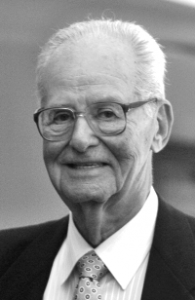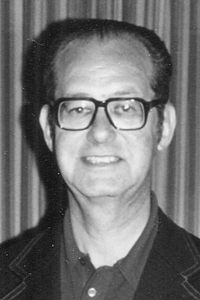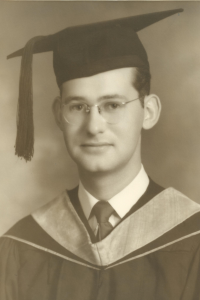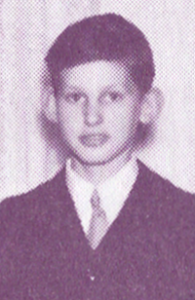Eulogy by Cantor Pamela Siskin
Seymour H. Saltzman was a doctor who made house-calls!
He made house calls the same way he fashioned his life. He made house calls because he loved the people within the houses. He loved getting to know people; he loved to make people smile, and he wanted to always to ease their suffering.
ROBERT, Seymour and Bernice’s son, declares he was ‘the best joke teller’. The thing about him telling jokes, he recalls, is that he had a perfect Yiddish accent, coming from a Yiddish speaking home, where it was his first language for many years.
As he began to tell a joke his face would begin to break into a grin, his eyes would sparkle, and before he could reach the end of the joke he would be laughing so hard that nobody could understand the punch line. ‘Sometimes’ Robert continued, ‘by the time dad reached the second line of the joke, Robert would already be overwhelmed with laughter just to watch his father fall into paroxysms of mirth. As Bernice, his beloved first wife of 49 years would confide many years later, it did not matter if you did not hear the punch line, because you could be sure it would come up at least seven more times over the course of a few years!
DAVID recalls that Seymour submitted one of his original jokes to BOB STEELE, who many of you might remember from WTIC radio, and who hosted a morning show that featured a joke a day. Seymour’s joke was picked and read on the air by Bob Steele.
The joke went:
‘What do you call a Chinese Laundry in France?’
Answer:
‘A Vishy Vashy’!!!
Seymour’s love of jokes belied his love of people. His goal as a doctor and as a person was to make people feel comfortable, cared for and appreciated. He knew how to win people’s hearts. With a jovial smile and a sincere interest in other people’s lives, he would ask his patients, his family, his friends, new and old, about their families, their hobbies, their ailments and their loves. This sincere regard for people gave him his celebrated bedside manner and a reputation as a warm and caring physician.
Even today, many years after his retirement from medicine, strangers would stop him in the supermarket and remind him that he had cared for them; for their mother; their son; their daughter and how much they missed his particular style of medical expertise and caring.
Since his illness and subsequent death so many people have called the temple office to express their sadness at his passing and to tell a brief story of their memorable relationship with him as a doctor, a congregant and a friend.
Today in a time when doctors are penalized by insurance companies for spending more than six minutes with each patient, Seymour belonged to a generation where a Doctor was allowed and expected to nurture and care for the whole human being irrespective of the ticking clock. He not only paid attention to their physical discomfort but he paid attention to the entire person, and if it meant listening to, or telling a few jokes along the way, then Seymour was your man!!
Seymour had many interests, including bowling, (especially with his fellow REGENTS) and up until a few short months ago, he bowled competitively with his children and grandchildren, and reigned triumphant over them all! He loved square dancing, playing the piano, the accordion, the ukulele and blowing the Shofar on Yom Kippur. He loved fishing, and collecting coins and stamps. He loved to read and do crossword puzzles – but his over-riding hobby, – his passion, apart from his family, his wife of blessed memory Bernice (who died on the very date Seymour died – 12 years ago) and his wife of almost ten years, Helen, was his love of Genealogy.
He retired from medicine quite early, at the age of 61, so that he could pursue the history of his family. He traveled abroad; he researched documents in various major libraries; he contacted those who had been long forgotten, and he persuaded all the members of his family to contribute their life cycle dates; their ancestry; their offspring and their links to the past – both near and distant.
In our library here at CBI we have a copy of his gorgeous family history called the ‘Shkolnick Archives’ and every year he published a newsletter which he distributed to all members of the family in all the countries in which they lived. He found family in Argentina; in Israel; in Europe and in America. He was fascinated and entranced by roots that could tell him who he was, who they were, and how they had lived.
LISA smilingly recalls how when her parents used to visit her in Israel, he would throw impromptu family gatherings in her home – mostly with family they’d never met – and some whom they really did not like– but they came, and out of these gatherings some valuable and treasured connections were formed.
DAVID says that he was inspired by his father’s work.
‘Sometimes when I have a bad day, I think of my father and his family and all the terrible hardships they had to endure to get us where we are today, and that knowledge gives me the strength to push aside my fears because I know I have the family genes, history and strength to carry me through’. ‘My father came from a poor family, and they suffered many set backs, but he built up his practice and his career and never felt that he had been under privileged or unlucky’.
When I asked Helen how she had met Seymour she told me that she had been college friends with Bernice, and even after college they had kept in touch. One day Bernice called Helen and said:
‘I have met a wonderful man, and I’m going to marry him!’ Helen thought she was a little crazy as Bernice had only known him for a short time and how could she possibly know what sort of person he might be.
But Bernice knew her heart of course, and she and Seymour were married in 1951. They had three children, Robert, David and Lisa who married Beth, Ana and Yuval, and who carried on the family tree business with Doron, Smadar, Amit, Daniel and Jonathan.
Much later, When Bernice told Helen that she was sick and that she would be coming to New York City for some tests, Helen was eager to meet with them, for she had never met Seymour, but Bernice explained that Seymour wanted to keep the family affairs private and that he prefer she did not come. Helen was dismayed and then thought to herself ‘Hmm! What sort of a husband can he be?!’
When Bernice died, Helen wrote a letter to the family, and Seymour wrote a thank you note in return. A few weeks later Helen became sick and because she was bored, and wanted something to do, she answered Seymour’s letter with a letter of her own. And so it went. Eventually they decided to meet at the EXIT 10 Diner in Connecticut, and as Helen walked into the restaurant she saw a man sitting alone who slowly ‘unfurled’ himself from behind the booth.
‘He was so tall, and he seemed like a nice fellow, and we talked for a long time, he was easy to be with. Maybe he had been a good husband for Bernice after all!
Helen and Seymour dated for two years – what prompted them to marry was a long phone call that Helen made to Seymour driving her car on her way down to Miami while Seymour was visiting Robert and Beth in California. It was a two hour call, and cost a fortune. It was much cheaper to get married … and so they did!
I asked Helen why she had fallen in love with Seymour.
‘He was a gentle man and a gentleman. Our favorite activity was to sit on the porch together and read the newspapers. He would get up before me, and he would collect all the papers after they were delivered and have them waiting for me when I came out onto the porch. He always greeted me with his warm smile and ‘good morning sweetheart!’. You would never think that a man could say that every morning to his wife – but he did, and he always made it clear that he meant what he said – I was his sweetheart – and we made each other happy. Helen and Seymour had nearly ten years together, and every day was a gift.
Seymour loved Congregation Beth Israel and had many friends here. He and Bernice re-instated the mid-week minyan services to offer solace to those who were bereaved. When Bernice died, Seymour found the communal act of saying Kaddish every day was a ritual that was necessary to his own spiritual well-being and even after the traditional eleven months of mourning for Bernice, he continued to lead services for the well-being of others. He had great regard for Rabbi Feldman (of blessed memory) and fondness for Rabbi Stephen Fuchs, (who is out of the country at the present time and regrets his absence at this funeral).
Seymour’s passion for genealogy was the natural culmination of all that inspired his soul. His curiosity about the lives of all people, from the waitress in the restaurant with whom Seymour endlessly bantered before placing an order so that his suffering family could eat in a timely manner, to his deep concern for patients who could rely on him for physical diagnosis and for spiritual compassion. From the two women, Bernice and Helen who were his beloved and revered wives, to his children, his grandchildren, and Helen’s own devoted children and grandchildren.
There is a verse we recite at the end of the Torah service which states:
Eyts Chayim Hi, l’ machazikim ba
IT IS A TREE OF LIFE TO THEM WHO HOLD FAST TO IT.
The roots of the genealogy tree run deep and the branches of the tree runs wide. The trunk is strong and true and endures for eternity.
Let us all hold fast to the memory of our congregant, friend, father, grandfather, husband and healer.
Ken Yhi Ratzon
May it be G-D’s Will.



